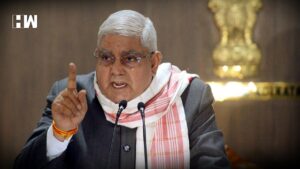Rajya Sabha Chairman Dhankhar Speaks On NJAC Verdict In His Remarks In Upper House

Dhankar said, “This process fructified into a Constitutional prescription, after 16 State Assemblies out of 29 States ratified the Central Legislation” New Delhi: Vice President Jagdeep Dhankhar who is also Chairman of the Rajya Sabha on Wednesday spoke on the 99th Constitutional Amendment Bill paving way for the National Judicial…
The post appeared first on .


Dhankar said, “This process fructified into a Constitutional prescription, after 16 State Assemblies out of 29 States ratified the Central Legislation”
New Delhi: Vice President Jagdeep Dhankhar who is also Chairman of the Rajya Sabha on Wednesday spoke on the 99th Constitutional Amendment Bill paving way for the National Judicial Appointment Commission (NJAC) which was undone by the Supreme Court in 2015.
“…the Parliament in a much needed historic step passed the 99th Constitutional Amendment Bill paving way for the National Judicial Appointment Commission (NJAC). There was unprecedented support for the above. On August 13, 2014, the Lok Sabha unanimously voted in its favour with there being no abstention. This House too, passed it unanimously on August 14, 2014 with one abstention. Rarely in Parliamentary democracy, there has been such massive support to a Constitutional legislation,” Dhankhar said.
“This process fructified into a Constitutional prescription, after 16 State Assemblies out of 29 States ratified the Central Legislation; the President of India in terms of Article 111 accorded his consent on December 31, 2014,” he said.
The Rajya Sabha Chairman further said, “This historic parliamentary mandate was undone by the Supreme Court on October 16, 2015 by a majority of 4:1 finding the same as not being in consonance with the judicially evolved doctrine of ‘Basic Structure’ of the Constitution.”
He added, there is no parallel to such a development in democratic history where a duly legitimised constitutional prescription has been judicially undone. This a glaring instance of severe compromise of parliamentary sovereignty and disregard of the mandate of the people of which this house and the Lok Sabha are custodians.
Dhankhar emphasised that Parliament is the exclusive and ultimate determinative of the architecture of the Constitution.
“We need to bear in mind that in democratic governance Basic of any ‘Basic Structure’ is the prevalence of primacy of the mandate of the people reflected in the Parliament. Parliament is the exclusive and ultimate determinative of the architecture of the Constitution,” he said.
“It is disconcerting to note that on such momentous issue, so vital to democratic fabric, there has been no focus in the Parliament, now for over seven years. This House, in concert with the Lok Sabha, being custodian of the ordainment of the people, is duty bound to address the issue, and I am sure it will do so,” he added.
“Authorities in constitutional positions in any institution are required to exemplify their conduct by high standards of propriety, dignity and decorum. Time for all constitutional institutions to reflect and give quietus to public display of adversarially challenging stance/trading or exchange of advisories emanating from these platforms. I urge the Members of the House to proactively catalyse evolution of wholesome cordial ecosystem ending this aberration,” he said.
Also Read:
“It is institutional seamless connect marked with mutual trust and respect that generates eco system best suited for serving the nation. This House needs to catalyze this wholesome environment to promote synergic functioning of Constitutional Institutions, emphasising need to respect Laxman Rekha,” he added.
In 2014, the National Democratic Alliance government brought the National Judicial Appointments Commission (NJAC) Act in an attempt to change the system of appointment of judges.
The NJAC was a proposed body, which would have been responsible for the appointment and transfer of judges to the higher judiciary. The NJAC Act and the Constitutional Amendment Act came into force on April 13, 2015. But the top court on October 16, 2015, struck down the NJAC Act. The verdict brought back the primacy of the collegium system of judges appointing judges.
(Except for the headline, this story has not been edited by HW News staff and is published from a syndicated feed.)
The post Rajya Sabha Chairman Dhankhar Speaks On NJAC Verdict In His Remarks In Upper House appeared first on HW News English.


